“In any business, you can’t be complacent,” says Marcus Lemonis. “If you do, you’re going to go backwards.” For business owners that means gaining a competitive advantage in your products, services and branding – and making any changes necessary to stay relevant to your customers.
Through the decades, product differentiation has been crucial to the success of Fortune 500 companies. Think about Coca-Cola’s secret taste formula, Whole Foods’ commitment to organic fruits and vegetables, and Zoom’s easy one-click approach to video calls. Product differentiation has also empowered millions of small business owners who market their goods and services in a way that sets them apart from their competitors.
In fact, product differentiation revolves around establishing a powerful proposition for your customers – sometimes called a “unique selling proposition” – and then using your communication channels to get that message out to your audience. Your prospects and customers should feel that you offer something special that isn’t available from other sources.
In general, product differentiation is most valuable for a start-up, seeking to capture a segment of an existing market. It’s also helpful for growing businesses that plan to enter new markets, where prospects are not familiar with the brand. In either case, a well-planned approach can lead to higher sales and profits.

For instance, product differentiation was the foundation for the success of a New York dessert restaurant founded in 2014. The establishment offered an Asian-inspired shaved-cream dessert that stood out in the crowded marketplace. But after expanding too quickly, the owner turned to Marcus for advice. Along with closing unprofitable stores and outsourcing the production process, Marcus recommended expanding the product line. Now, customers can get their shaved-cream desserts dipped in a variety of sauces. The company also serves ice cream sandwiches and cakes that can be customized for special events, increasing the business’ profit margin. Meanwhile, the company is continuing to grow thanks to its effective product differentiation strategy.
Find the Right Strategy
Every business takes its own approach to product differentiation. You might focus on the expertise and service capabilities of your people, your customer service processes or the strength of your brand, as well as your products. As Marcus says, business success is all about people, processes and products.
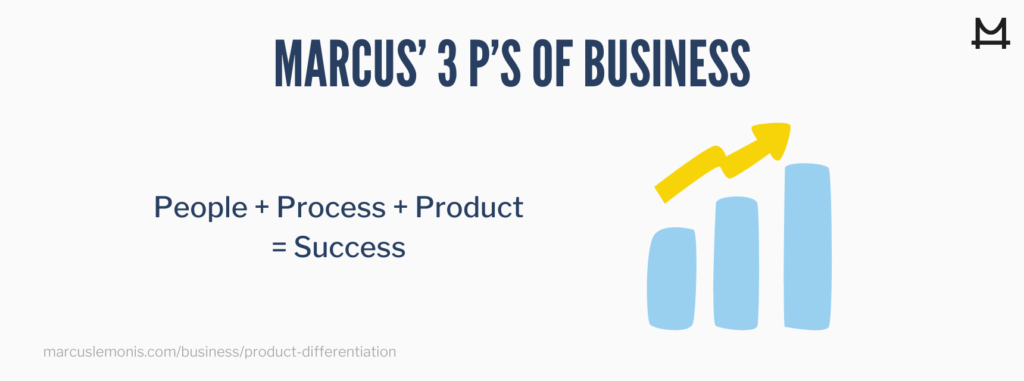
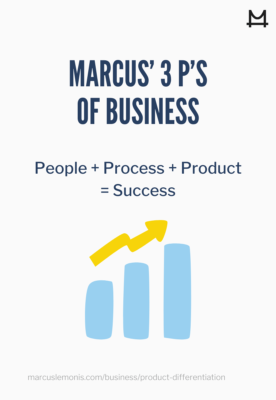
But product differentiation is not a one-and-done event. Your customers’ needs and desires are constantly changing, and you need to keep up with your market. If your business feels stuck in a rut, then it may be time to reinvent your offerings, and generate renewed excitement among your customers and your employees. As Marcus says, “If you don’t evolve, you will die.”

In addition, product differentiation should be more than just a marketing ploy. It needs to be based on facts. Otherwise, you will lose the trust of your customers by over promising and under delivering. You should also be sure that your customers value the qualities that make your products or services different from the competition. Surveys and focus groups can help you understand your audience so you make well-informed decisions about product differentiation, rather than relying on your personal impressions and feelings. After all, you don’t want to make a big investment and have your audience respond with a yawn to your offerings.
Finally, you need to identify the right target audience. You might be successful in appealing to a small niche of prospects, but not to the broader marketplace. On the other hand, a wider market strategy aiming for everyone might not be effective in focusing on the distinctive features and benefits of your offerings. In other words, product differentiation needs the right “Goldilocks” approach – not too much and not too little, but just right – in order to be effective. Of course that balance varies from business to business.
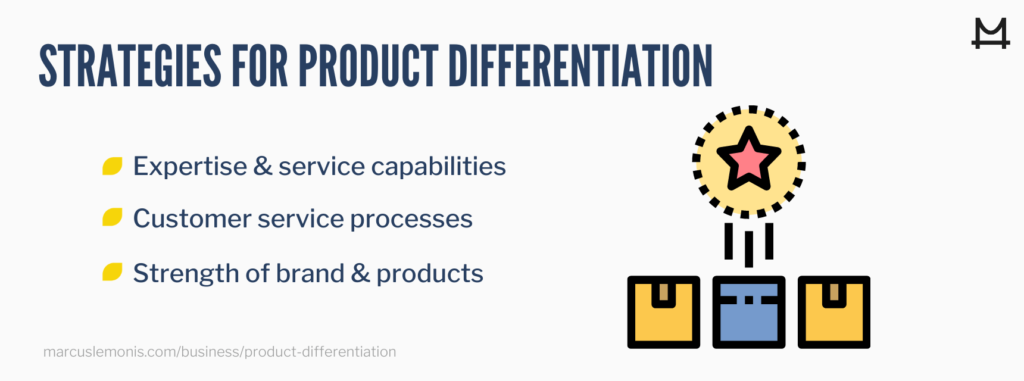
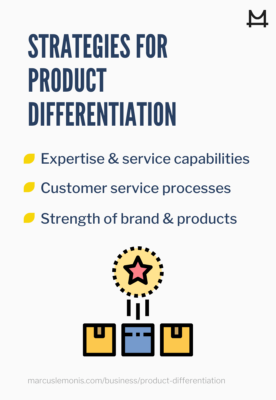
Protect Against Threats
It’s not enough to offer better products or services than the competition. You also have to protect your advantage. In some cases, that might mean guarding your intellectual property rights by registering trademarks, or perhaps licensing your products to a larger company willing to pay you an ongoing fee for those rights.
You also need to be aware of the copycat threat. Once you have successfully carved out a niche in your market, other businesses are likely to follow in your wake. That can lead to a price war that reduces your profit margin as you scramble to keep up. After all, there is always someone out there willing to charge less for a similar product or service. That fundamental aspect of business makes it difficult to succeed with a product differentiation strategy based on price.

Finally, your customers might shift away from your business in search of something new and exciting. This risk is higher for commodity businesses, than for industries driven by innovation. So, be careful not to base your product differentiation strategy on features or benefits that could rapidly become outdated. Otherwise, you might have to make a shift in your messaging sooner than desired, reducing your ability to build long-term customer loyalty.
Reinvent Your Products
If you are facing a slowdown in sales or a price war with the competition, then it may be time to reinvent your products or services. Bring your team together for a brainstorming session or conduct a market analysis to see what could give you an edge in the future.
For instance, a Mexican restaurant in New York became known throughout the region for its tortillas. In 2006, the company began selling its tortillas in stores, but found itself in a financial bind when a national competitor entered the tortilla market.

A well-known comedian and fan of the restaurant introduced Marcus to the owner and asked him to help. Together, they researched Mexican food trends and developed a new salsa product to help differentiate the company’s product offerings and provide a new revenue source.
Here are several aspects of product differentiation to consider:
Features and Benefits
Can you add new features to your current products that will benefit your customers? Are the new features readily apparent to a prospective customer or are they improvements to some other aspect? Once you determine what features are likely to appeal to your market, you should also conduct a careful cost-benefit analysis. If you need to buy expensive new machinery or pay for software development, the costs may outweigh the financial rewards. In other words, don’t get carried away by an exciting potential offering. Make sure your product differentiation strategy can also deliver a profit to your business.

Extend Your Current Line
Another approach to the market involves extending your current lines. You could then position your business as a “comprehensive” or “integrated” provider of valued products or services, as opposed to the competition. This strategy also creates opportunities for upselling and cross-selling, or increasing your revenue by entering new markets.
Redesign Your Offerings
If your business is in a stable position, redesigning your current offerings can also be an effective approach to product differentiation. A new logo and artwork on the packaging or the contents can provide fresh life to a product your customers may be taking for granted.

Offer a Guarantee
To distinguish your products from the competition, you may be able to offer a guarantee or a warranty of performance. If you are an online retailer, for instance, you could offer a guarantee of satisfaction, backed by free return shipping plus a discount on the next order –whatever it takes to make your store stand out from the crowd.
Customer Service
Many businesses use customer service as a differentiation strategy. One example is electronics retailer Best Buy, which markets its “Geek Squad” to help consumers set up and maintain their home systems.
Respond to Market Changes
Many factors can change the behaviors of your customers, including new technology, economic conditions, health concerns and government regulations. Your business needs to pay attention to these trends and issues, and respond in a way that maintains your market advantages.

One company that took this advice to heart was a family owned hair care products company in North Carolina that serves salons, barbershops and cosmetology schools throughout the U.S. and in international markets. Marcus met with the owners in 2017 and has stayed in touch over the years, recently following up with a 2020 video conference with the couple and their daughter, who is now the Chief Executive Officer. After the COVID-19 pandemic closed many in-person salons, the company was able to ramp up its online sales and continue its successful product differentiation approach to the market.
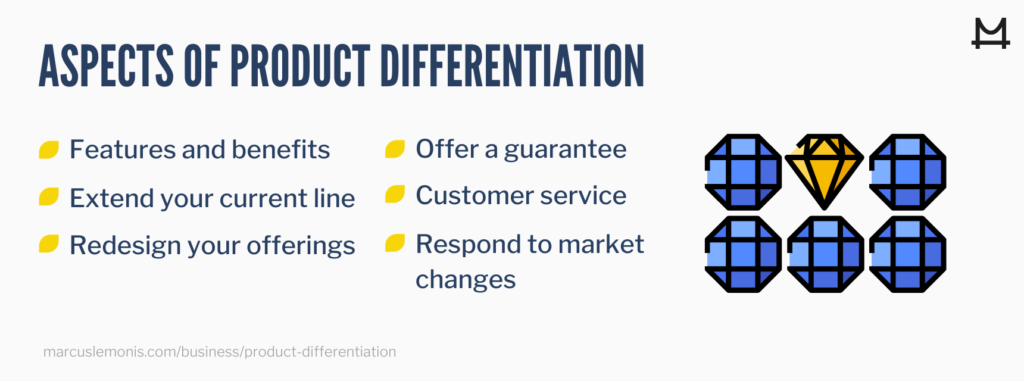
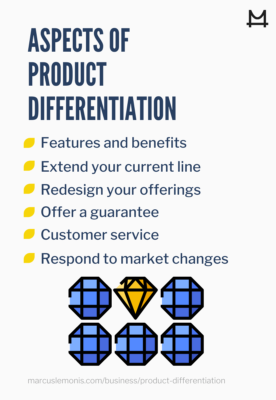
Stand Out in Your Market
Product differentiation can make you stand out in the market, establish the value of your products and services and create customer loyalty. But do your homework to find the best way to succeed in the competitive world of product differentiation. As Marcus says, business owners should be practical and purposeful in order to be profitable.
- How are you going to differentiate your product from the competition?
- What new things are you going to apply to your business after reading this article?





